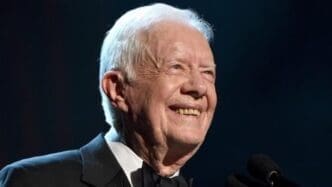The 39th President of the United States, Jimmy Carter, passed away at the age of 100. Although his tenure in the Oval Office was marked by significant challenges, it was his post-presidential contributions that truly defined his legacy.
Jimmy Carter, born on October 1, 1924, in Plains, Georgia, ascended to national prominence from humble beginnings on a peanut farm. His rise to the presidency was fueled by his straightforward demeanor and commitment to Christian values, which resonated with a nation disillusioned by prior political scandals. Carter’s election marked the first time since the Civil War that a candidate from the Deep South held the presidency, heralding a period of both promise and significant challenges.
During his presidency, Carter faced formidable domestic and international hurdles, including double-digit inflation, an energy crisis, and geopolitical tensions arising from Soviet actions in Afghanistan and the Iranian hostage crisis. Despite his relative lack of experience on the global stage, Carter approached these issues with resilience and idealism, steadfast in his belief that political leadership should prioritize the greater good rather than serve entrenched interests.
Carter’s tenure was marked by notable achievements in international diplomacy. He was instrumental in brokering a peace treaty between Israel and Egypt, a milestone in Middle Eastern diplomacy that endures to this day. Additionally, he secured a nuclear arms agreement with Russia and was the first U.S. president to officially recognize China, further shaping foreign policy in transformative ways.
Despite these accomplishments, Carter’s candid perspective and unvarnished outlook on America and global affairs led to a challenging relationship with the electorate, which ultimately favored the optimistic rhetoric of Ronald Reagan in the subsequent election. Nevertheless, Carter’s departure from the White House marked the beginning of an expansive and impactful path in humanitarian efforts and global advocacy.
Over the course of 38 years following his presidency, Carter dedicated his life to championing human rights and democracy worldwide. His initiatives, facilitated through the Carter Center, played a pivotal role in promoting global peace and supporting emerging democracies. Carter also tackled neglected diseases, elevating these issues within the international community.
Perhaps most visibly, Carter’s partnership with Habitat for Humanity brought significant attention and resources to the cause of affordable housing. His hands-on involvement, which he continued well into his nineties, highlighted his commitment to service and community engagement. Concurrently, Carter maintained active participation in educational and religious activities, teaching Sunday school in his hometown and engaging with academic institutions.
Even in his later years, Carter remained prolific in authorship, producing numerous works that spanned topics of faith, politics, and personal reflections. His unwavering adherence to his values, even when politically inconvenient, underscored a life dedicated to integrity and service – principles that he carried with him from Plains to the world stage.
While not considered among the most influential presidents during his time in office, Jimmy Carter’s post-presidential legacy illustrates a profound commitment to humanitarian causes and global advocacy. His life serves as a testament to the enduring impact one can have beyond traditional political roles.
Source: News4jax








